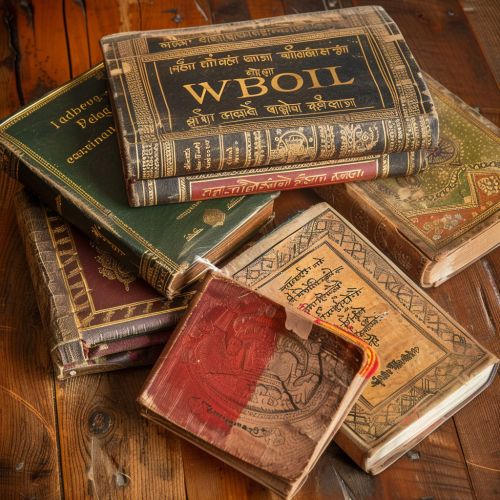Hindu Scriptures
Introduction
Hinduism, one of the world's oldest religions, has a rich history of religious texts and scriptures. These scriptures, known collectively as the Hindu Scriptures, form the foundation of Hindu philosophy, rituals, and beliefs. They are divided into two main categories: Shruti and Smriti.
Shruti Texts
The term 'Shruti' translates to 'that which is heard'. These texts are considered the most authoritative and sacred in Hinduism, as they are believed to be the direct revelations of the divine. The Shruti texts are further divided into the Vedas and the Upanishads.
Vedas
The Vedas are the oldest and most sacred of the Hindu scriptures. They are composed in ancient Sanskrit and are believed to have been revealed to the ancient sages, or 'rishis', during deep meditation. The Vedas are divided into four main categories: the Rigveda, the Yajurveda, the Samaveda, and the Atharvaveda.


Rigveda
The Rigveda is the oldest of the four Vedas and is composed of hymns dedicated to various deities. These hymns are believed to invoke the deities and seek their blessings. The Rigveda is also a rich source of information about the social, religious, and political life of the early Vedic period.
Yajurveda
The Yajurveda is primarily concerned with the rituals and ceremonies associated with sacrifices. It provides detailed instructions for the conduct of these rituals and the mantras to be chanted during them. The Yajurveda is divided into two main sections: the White Yajurveda and the Black Yajurveda.
Samaveda
The Samaveda is a collection of hymns and songs that are sung during the performance of the rituals and sacrifices described in the Yajurveda. The Samaveda is unique among the Vedas in that it is primarily musical in nature.
Atharvaveda
The Atharvaveda is a collection of spells, charms, and incantations. It also contains hymns to various deities and speculations on topics such as the nature of the universe and the origin of life.
Upanishads
The Upanishads are philosophical texts that explore the concepts of Brahman (the ultimate reality) and Atman (the individual soul). They are considered the culmination of Vedic thought and are sometimes referred to as Vedanta (the end of the Vedas).
Smriti Texts
The term 'Smriti' translates to 'that which is remembered'. These texts are considered less authoritative than the Shruti texts, but they are still highly respected and widely studied. The Smriti texts include the Puranas, the Mahabharata, and the Ramayana.
Puranas
The Puranas are a collection of ancient stories and legends about the gods, goddesses, and heroes of Hindu mythology. They are divided into 18 major Puranas and several minor ones.


Mahabharata
The Mahabharata is an epic poem that tells the story of the Kurukshetra War between the Pandavas and the Kauravas. It also contains the Bhagavad Gita, a conversation between Prince Arjuna and Lord Krishna, which is considered one of the most important texts in Hindu philosophy.
Ramayana
The Ramayana is an epic poem that tells the story of Prince Rama and his wife Sita. It is attributed to the sage Valmiki and is considered one of the two major Sanskrit epics of ancient India, along with the Mahabharata.
Conclusion
The Hindu scriptures are a vast and diverse collection of texts that provide insight into the religious, philosophical, and cultural aspects of Hinduism. They continue to be studied and revered by Hindus around the world, and their teachings continue to influence Hindu thought and practice.
